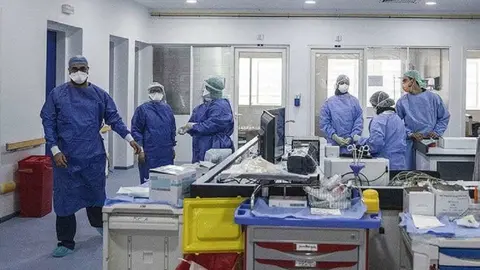Lessons from the cursed pandemic and express vaccines

The pandemic has been such a watershed that the agency has made a 360-degree turnaround in the wake of criticism and mistakes made in managing the health emergency caused by the coronavirus.
The WHO is now focused on strengthening international coordination in order to prevent, improve and eventually respond in a synchronised manner to outbreaks, whether epidemics or pandemics.
For example, the first disbursements from the Pandemic Fund totalled 338 million dollars last year, supporting 37 countries that received funding for a range of prevention, preparedness and response programmes.
Tedros Adhanom says WHO continues to work with countries and partners to improve genomic sequencing capacities and strengthen laboratory and surveillance systems worldwide, with a 62% increase in capacity for SARS-CoV-2 between February 2021 and December 2023.
Since the pandemic was declared in March 2020 until December 2023, the coronavirus has caused 20 million officially recognised deaths worldwide.
To date, there are nine COVID-19 vaccines produced by the following manufacturers: Pfizer-BioNTech, Janssen, Moderna, Sinopharm, Sinovac, Bharat, Novavax, Cansino and Valneva. The WHO continues to evaluate other vaccines in clinical and pre-clinical trials.
At the end of December 2020, the world reached the first million people vaccinated with at least one dose, and a few days later the number had already surpassed 20 million.
"One in 100 people had received at least one jab by February 2021 and this figure rose to one in ten by April. By the end of October 2021, half of the world's population had at least one dose, but there was a large gap between continents," according to the WHO.
The path to global immunity against the coronavirus showed in mid-March 2023 that there is still a long way to go: more than 5.5 billion people, or 71.3 per cent of the world's population, were already vaccinated with at least one dose.
On the subject
A few days ago there were still a total of ten COVID vaccines because the coronavirus vaccine developed by AstraZeneca-Oxford was also in use. This vaccine was very controversial from the outset: on 7 May last, AstraZeneca announced that it was completely withdrawing its COVID-19 vaccine from the market.
The WHO, which has declined to comment on the questions, does acknowledge that there are hundreds of complaints in several countries against Vaxzevria for causing thrombi.
In the UK, there is a class action lawsuit by nearly a hundred victims and their families for side effects caused by the vaccine: "One of the effects cited by the plaintiffs is thrombosis syndrome with thrombocytopenia, which is a blood clot in the blood vessels of the brain, legs or elsewhere in the body".
Before withdrawing the serum, AstraZeneca did acknowledge that thrombosis could occur in certain cases. This vaccine was used, not only in the UK, but also in Spain and almost all EU countries, to immunise groups of teachers and law enforcement officers; and, in a second stage, it was given to people between 60 and 69 years of age.
"One of the first cases to be prosecuted was that of Jaime Scott, who suffered a permanent brain injury after suffering a blood clot and haemorrhage in his brain that prevented him from working after receiving the vaccine from AstraZeneca in April 2021. In May 2023, AstraZeneca, also by court response, replied that it did not accept the thesis that Scott's case was caused by its vaccine," the BBC reported at the time.
In Spain, an Association of Essential Workers Affected by AstraZeneca has been created in which dozens of people affected in various Spanish cities have joined together to denounce "serious side effects". And this is just the beginning because the express vaccines, against the coronavirus, are on the way to give us more unpleasantness. So far, I have not had COVID-19, but I can say that after being vaccinated I have never experienced the flu I have been getting lately: with fever, stomach disorders, muscle pain in the joints, unstoppable cough and inflammation of the bronchial tubes. We have been guinea pigs for the laboratories, the consequences are beginning to emerge...


